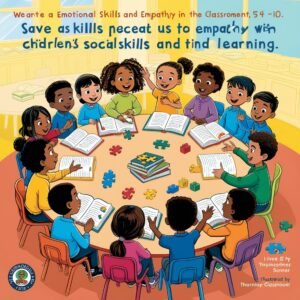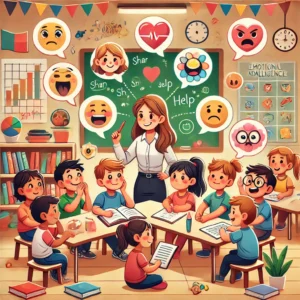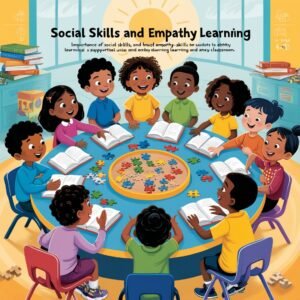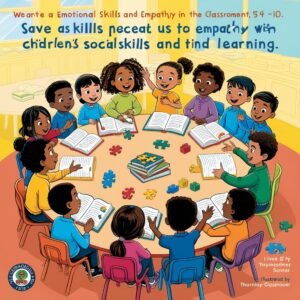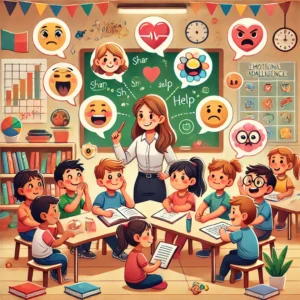“Emotional Intelligence in Children: Why EQ is Key to Success in Education“
The Vital Role of Emotional Intelligence in Enhancing Children’s Education
In today’s evolving academic landscape, the concept of emotional intelligence (EI) is gaining traction as an integral element in children’s overall development. While traditional education systems have long prioritized IQ, recent research highlights the growing need to nurture emotional awareness and social skills in young learners. Emotional intelligence, encompassing the ability to identify, regulate, and influence one’s feelings, as well as empathize with others, significantly impacts a child’s educational journey. This blog explores how fostering emotional intelligence can positively influence academic achievement, mental health, and social interactions, setting the foundation for lifelong success.
Core Components of Emotional Intelligence
To understand its significance in education, it’s important to break down the key elements of emotional intelligence. First introduced by psychologists Peter Salovey and John D. Mayer, and later popularized by Daniel Goleman, emotional intelligence is often defined through five core aspects:
- Self-Awareness: Understanding personal emotions and their effect on behavior.
- Self-Regulation: Managing emotional reactions effectively, particularly in stressful situations.
- Internal Motivation: Pursuing goals for intrinsic satisfaction rather than external rewards.
- Empathy: Recognizing and understanding the emotions of others.
- Social Skills: Building and maintaining positive interactions with peers and adults.
These foundational pillars enable children to manage not only their emotions but also navigate the social intricacies of school life, from academic pressure to classroom relationships.
Boosting Academic Performance through Emotional Intelligence
Academic success traditionally focuses on cognitive ability, but emotional intelligence offers a deeper layer of support for educational achievement. Children equipped with emotional understanding are better prepared to manage the stress and challenges of schooling.
Creating a Productive Learning Environment
When students learn to regulate their emotions, they can approach academic tasks with greater focus and resilience. Emotional intelligence empowers students to remain calm under pressure, whether facing difficult subjects, tight deadlines, or complex projects. This results in improved time management, persistence through challenges, and more effective study habits.
For example, emotionally intelligent children are more likely to engage in positive self-reflection, helping them identify areas where they need help or improvement without becoming discouraged. This not only enhances personal academic outcomes but also fosters a more supportive and collaborative classroom culture.
Enhancing Cognitive Processes
Emotions have a direct impact on how the brain processes information. Children with high emotional intelligence are less likely to experience anxiety, which can cloud their thinking and impede problem-solving abilities. Emotionally balanced students can better manage performance stress during exams, allowing them to think clearly and perform at their full potential. Studies also show that working memory improves when children are emotionally stable, which contributes to better learning retention.
Emotional Intelligence and Social Development
While academic growth is critical, a child’s ability to interact positively with others is equally important. Emotional intelligence helps children form stronger, healthier relationships, benefiting both their personal and academic lives.
Encouraging Conflict Resolution
Students who understand and manage their emotions are better equipped to resolve conflicts with peers. By fostering empathy and emotional awareness, emotionally intelligent children can approach disagreements calmly, consider various viewpoints, and work toward fair solutions. This not only minimizes classroom disruptions but also contributes to a more inclusive and peaceful school environment.
Additionally, students who practice empathy tend to offer support to classmates facing emotional difficulties, further enhancing the overall sense of community within the classroom.
Promoting Effective Communication
Strong emotional intelligence contributes to better communication skills. Emotionally aware students can clearly express their thoughts and feelings, making it easier for them to connect with teachers and peers. This improved communication helps them excel in group activities, build leadership skills, and foster collaborative learning environments. They are also more adept at interpreting non-verbal cues like body language and tone, making their interactions more meaningful.
Emotional Intelligence as a Tool for Mental Well-Being
Modern education often places high demands on children, potentially leading to stress and mental health challenges. By developing emotional intelligence, children gain valuable coping mechanisms to handle the pressures of school life.
Managing Stress and Anxiety
Children who are emotionally intelligent can recognize when they are feeling overwhelmed and take proactive steps to manage their stress. They can articulate their feelings and use healthy strategies like mindfulness, breathing exercises, or seeking guidance from trusted adults. This ability to self-regulate is particularly important in today’s education system, which often emphasizes academic performance over emotional health.
Building Emotional Resilience
Another critical benefit of emotional intelligence is emotional resilience—the capacity to recover from setbacks and move forward. Emotionally resilient children view challenges as learning experiences rather than insurmountable obstacles. This growth mindset promotes perseverance, helping students to continually strive for their goals despite academic or social challenges. Over time, this fosters a positive attitude that benefits their educational progress and mental well-being.
Integrating Emotional Intelligence into the Curriculum
Recognizing the advantages of emotional intelligence, many schools are now incorporating Social-Emotional Learning (SEL) programs into their curricula. These initiatives are designed to help students identify their emotions, develop empathy, and practice relationship-building skills, making emotional intelligence an active part of their education.
Teachers as Emotional Role Models
Teachers play a crucial role in cultivating emotional intelligence in students. By embedding SEL principles into their teaching practices, educators can create a classroom environment that encourages emotional growth. Techniques such as role-playing, group discussions, and reflective exercises allow students to practice empathy, self-regulation, and communication in real-life scenarios.
Additionally, teachers who practice emotional intelligence themselves serve as role models for students. When educators demonstrate calmness, empathy, and effective conflict resolution, they set an example for children to follow, further reinforcing emotional development.
Involving Parents in Emotional Growth
Parents also have a significant influence on their child’s emotional intelligence. Encouraging emotional conversations at home, practicing mindfulness, and offering support during emotional challenges can reinforce the lessons taught in school. Simple practices such as asking children about their feelings after school or discussing how to handle difficult situations can help solidify emotional intelligence as a lifelong skill.
Conclusion
Emotional intelligence is an invaluable asset in a child’s educational journey, enhancing both academic performance and social development. By nurturing emotional awareness, students become better equipped to handle the pressures of school, build strong relationships, and maintain mental well-being. As schools and families increasingly recognize the importance of fostering emotional intelligence, we are preparing the next generation not only for academic success but for a lifetime of personal growth and achievement. The role of emotional intelligence in children’s education is pivotal, shaping well-rounded individuals who are capable of thriving in a complex world.

